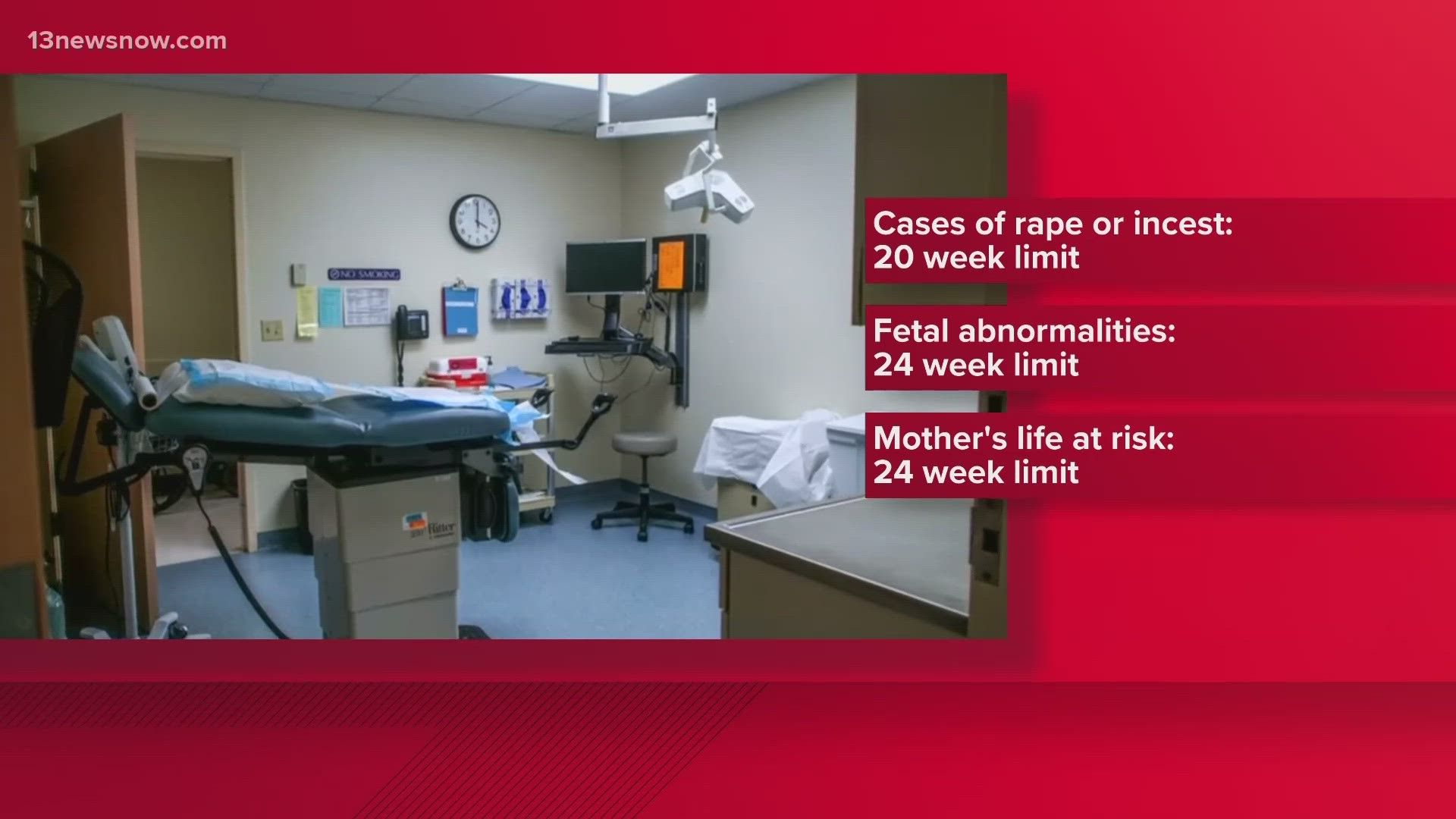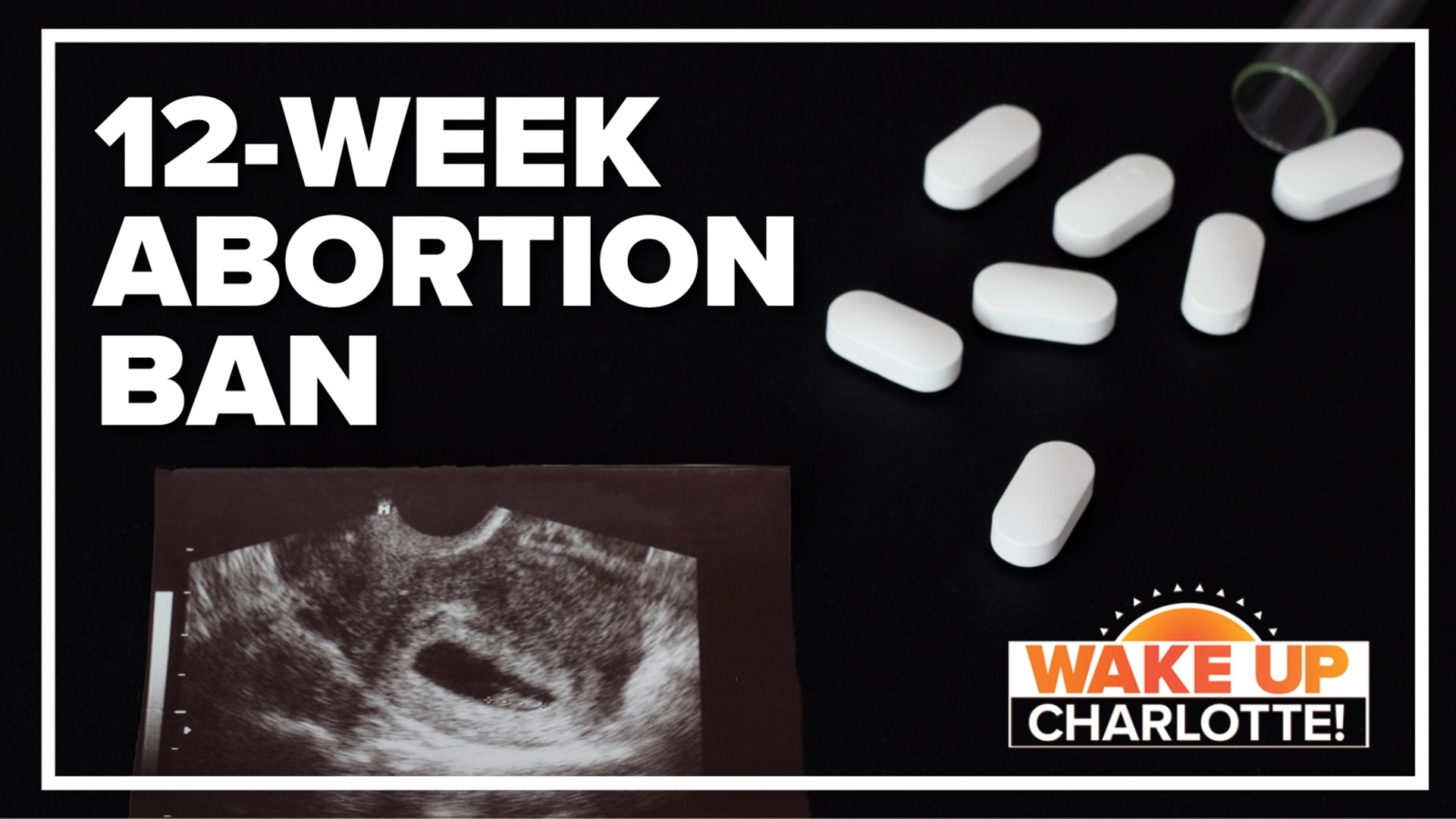RALEIGH, N.C. — North Carolina's state Senators voted 30-20 Tuesday to override Democratic Gov. Roy Cooper's veto of the Republican-endorsed 12-week abortion ban. Hours later, the state House voted similarly 72-48, meaning the ban will go into law on July 1, 2023.
On Monday, Republican leaders said they believed they had enough votes in both chambers of the General Assembly to override Cooper's veto on Senate Bill 20 to push it into law.
The bill will ban nearly all abortions after 12 weeks of pregnancy. It also places limits on new exceptions, capping abortions at 20 weeks in cases of rape or incest and 24 weeks for "life-limiting" fetal anomalies, including certain physical or genetic disorders that can be diagnosed prenatally. An existing exception for when the life of the pregnant woman is in danger would remain in place.
Cooper vetoed the bill during an abortion rights rally in Raleigh on Saturday. He pledged to veto the bill when it first cleared the General Assembly, calling it an "egregious, unacceptable attack on women."
On the other side, Sen. Joyce Krawiec, a Forsyth County Republican who helped author the legislation, said conservatives viewed this as "an opportunity to put forth a very pro-life, pro-woman legislation."
Krawiec was joined by fellow Republican senators Lisa Barnes (Nash County), Amy Galey (Alamance County) and Vickie Sawyer (Iredell County) in releasing this statement:
This is a monumental moment for women, children, and families in North Carolina. Our bill puts to rest all of the noise and lies we’ve been hearing this past week, and brings to life a culture that cherishes motherhood and saves the lives of the unborn.
Rep. Tricia Cotham - a Mecklenburg County state representative who switched from Democratic to Republican recently - confirmed she voted in favor of the bill. While she has not responded to requests for comment in recent weeks, she shared this statement Tuesday night after casting her vote:
I understand that there are extremists on both sides of the abortion issue. Some of the absolutists believe abortion is unacceptable in any circumstance and some of the absolutists believe aborting a perfectly healthy child in the 40th week of pregnancy is morally acceptable. I cannot support either of these extreme positions.
I - like most North Carolinians - think abortion is a complicated issue without absolute answers. Abortion is an unpleasant subject for many women, and I know of no woman that considered having an abortion that did so flippantly or unseriously. Despite what some people on the fringes may claim, contemplating an abortion is a grave decision, not a choice I’ve ever known anyone to celebrate.
After extensive review, I believe this bill strikes a reasonable balance on the abortion issue and represents a middle ground that anyone not holding one of the two extremist positions can support.
This legislation gives women continued access to elective abortions during the first trimester of a pregnancy in consultation with their doctor. This is the timeframe when most abortions occur. However, this bill ends elective late term abortions in North Carolina. While crucially providing exceptions for rape, incest, severe fetal abnormalities, and to protect the life of the mother. Women continue to be guaranteed unrestricted care in the event of a miscarriage or ectopic pregnancy.
I insisted that any abortion legislation include meaningful support and protections to mothers and children to give them the best chance at a good life. This bill provides hundreds of millions of dollars in support for paid parental leave, maternal healthcare, foster care, contraception, and community college tuition and job placement supports to ensure that women and their children have choices, protections and pathways to success. Finally, this bill provides important protections to mothers and children by keeping weapons out of the hands of domestic abusers and ensuring sexual child predators have lifetime GPS monitoring and tracking.
Some call me a hypocrite since I voted for this bill. They presume to know my story. As I said at the time, I had an ectopic pregnancy that sadly ended in miscarriage, not an elective abortion. In fact, Senate Bill 20 affirms the life-saving care I received in that dire situation. It was very important to me that this legislation protects all women going through a miscarriage or other complications - and it most certainly does.
House Speaker Tim Moore shared a statement echoing Cotham's sentiments, saying "I am proud that the House has overridden the Governor’s veto of this meaningful, mainstream legislation. Senate Bill 20 will save lives and provide needed support for women and families while putting North Carolina’s abortion law in line with the most of rest of the free world. Today the North Carolina House of Representatives has affirmed the value of human life, and I am proud that the 'Care for Women, Children, and Families Act' is now law."
Reaction from North Carolina Democrats was swift as well, hitting back at anti-abortion lawmakers. Anderson Clayton, chair of the North Carolina Democratic Party, shared this statement:
Today, Republicans have sent a message to North Carolinians that they don’t trust them to make their own health care decisions. SB20 is dangerous legislation that puts politicians in the middle of deeply personal health care decisions and abandons the medical advice of doctors who urged lawmakers to stop this ban. It will have devastating impacts on abortion access, putting up medically unnecessary barriers to reproductive care and for many – it may impact their access altogether.
It is shameful to see Republican members John Bradford, Tricia Cotham, Ted Davis, and Michael Lee flip-flop and betray their constituents to toe the party line. In 2024, North Carolina Democrats will ensure every voter knows where their leaders stand on this issue and will continue to fight to elect candidates that stand up for reproductive freedom in North Carolina.
Gov. Cooper also hit back at the veto override:
Strong majorities of North Carolinians don’t want right-wing politicians in the exam room with women and their doctors, which is even more understandable today after several Republican lawmakers broke their promises to protect women’s reproductive freedom.
For the last two weeks, Republican sponsors of this abortion ban have strenuously argued that it is much less restrictive than we warned, so we will now do everything in our power to make sure that’s true.
North Carolinians now understand that Republicans are unified in their assault on women’s reproductive freedom and we are energized to fight back on this and other critical issues facing our state. I will continue doing everything I can to protect abortion access in North Carolina because women’s lives depend on it.
North Carolina Attorney General Josh Stein - who is running for governor in 2024 - echoed Cooper with his own response:
This bill is about controlling women and taking away their freedoms. And they are not done yet. They will keep coming until they completely ban abortion in every instance. We can’t let them.
So, despite this defeat, we will keep fighting at every turn. Our freedoms are too important to ever give up.
Reaction also came from the highest level of the federal government, with White House Press Secretary Karine Jean-Pierre offering this statement:
Today, Republican state legislators in North Carolina overturned Governor Roy Cooper’s veto of a dangerous bill that is out of touch with the majority of North Carolinians and will make it even more difficult for women to get the reproductive health care they need.
We’ve already seen the devastating impacts that state abortion bans have had on the health and lives of Americans living under these draconian laws. In the more than a dozen states with bans, women have been turned away from emergency rooms, left with no choice but to travel hundreds of miles for the care they need, and faced complications that put their lives and health at risk. Like those laws, the North Carolina ban will harm patients and threaten doctors for providing essential care.
President Biden and Vice President Harris will continue to work alongside Governor Cooper, state legislators, and Americans who are fighting to protect access to reproductive health care in the face of relentless attacks, and will continue to call on Congress to restore the protections of Roe for all people in every state.
"This bill is not medically sound. I think there's a lot of misinformation," Dr. Beverly Gray, an associate professor of obstetrics and gynecology at Duke University, said.
Gray said her colleagues unsuccessfully tried to convince lawmakers to keep the 20-week abortion restriction in place. Other physicians say it's not a black-and-white issue.
"This is such a hard and difficult topic," Dr. Susan Bane, the medical director of the Choices Women's Center in Wilson, said. "And it is not settled science."
Bane opposes abortion from conception and says it's based on the oath she took as a physician. The Catholic Diocese of Charlotte and Raleigh issued a statement Monday in support of the bill, saying, "While this bill is not perfect, we hope it will become law to advance protection for unborn children and support for mothers in need."
Abortion Re-emerging as Marquee Political Issue
Susan Roberts, Professor of Political Science at Davidson College, has focused her studies on reproductive politics for about a decade and notes abortion rights has re-emerged as a marquee political issue following the overturning of Roe V. Wade. She thinks it will be a main issue coloring elections to come, on a national level and locally.
"People are going to start paying more attention to the statehouse and the down-ballot races than they ever had before," Roberts said. "As you see more and more momentum now in passing restrictions in red states, I think you're going to see Republicans feel empowered."
The Guttmacher Institute tracks abortion policies by state and classifies North Carolina and 25 other states as having restrictive to most restrictive abortion policies in the post-Roe era.
"There's a trend, and they may be reading the tea leaves--but I think they see this as an opportunity to further an agenda that is Conservative... This is going to be, I think, more firmly the issue for the general election coming up."
How vetoes work in North Carolina
In North Carolina, the governor can veto a bill, sending it back to the General Assembly for reconsideration. Unlike some states, including South Carolina, North Carolina does not give its governor line-item veto power, meaning he or she can only veto an entire bill, not single items within a piece of legislation.
Here's how an override works:
In order to override a veto that's been sent back by the governor, three-fifths of lawmakers in both chambers must agree to pass the bill. In this particular case, Republicans have enough members in the House and Senate to override a veto from the governor, provided all lawmakers vote along party lines. If just one Republican in the House voted against the bill, the veto override would fail.
The GOP is able to override Cooper's veto authority due to having three-fifths of the vote in each chamber. When longtime Democratic Rep. Tricia Cotham switched parties in April, just months after winning reelection in District 112, Republicans secured enough votes to have the "veto-proof" supermajority in both chambers.
Flashpoint is a weekly in-depth look at politics in Charlotte, North Carolina, South Carolina, and beyond with host Ben Thompson. Listen to the podcast weekly.
SUBSCRIBE: Apple Podcasts || Spotify || Stitcher || Google Podcasts
All of WCNC Charlotte's podcasts are free and available for both streaming and download. You can listen now on Android, iPhone, Amazon, and other internet-connected devices. Join us from North Carolina, South Carolina, or on the go anywhere.


